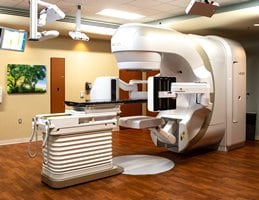Recognizing, Diagnosing and Treating Colorectal Cancer
-Mahesh Karamchandani, MD – Bronson Colon & Rectal Surgeon
Colorectal cancer is the third most commonly diagnosed form of cancer in the U.S., and currently, young-onset colorectal cancer is on the rise. Over a 10-year period, rates in people under age 50 increased 2.2 percent annually, while rates in people over age 65 dropped by 3.3 percent each year.
What is Colorectal Cancer?
Colon cancer is cancer of the large intestine (colon), the lower part of your digestive system. Rectal cancer is cancer of the last several inches of the colon. Together, they're often referred to as colorectal cancers. Most cases of colon cancer begin as small, noncancerous clumps of cells called adenomatous polyps. Over time some of these polyps become colon cancers. It is the third leading cause of cancer-related deaths in the United States among men and women, and is expected to cause about 52,580 deaths during 2022 (Colorectal Cancer Alliance).

March is Colorectal Cancer Awareness Month
Did you know?
- This year, an estimated 151,000 Americans will be diagnosed with colorectal cancer.
- The average age of colorectal cancer diagnosis in the U.S. is 66 years old.
- Colorectal cancer rates are 20 percent higher in African Americans.
What Are Some Colorectal Cancer Risk Factors?
Some factors that may increase your risk of colon cancer include:
- Age: Colorectal cancer is most common in people over the age of 50, with an increased chance of developing it with each decade. However, the number of adults under age 50 who are developing colorectal cancer is on the rise.
- Personal history: People with history of colitis and/or colon polyps, as well as women who have a history of ovarian, uterine or breast cancer, have a somewhat higher risk of developing colorectal cancer.
- Family history: Most colorectal cancers are found in people without a family history of colorectal cancer. Still, as many as 1 in 3 people who develop colorectal cancer have an immediate family members who has had it.
- Race: Black people and Native Americans are at a higher risk to develop colorectal cancer than other races. According to the American Cancer Society, “The reasons for this are complex, but they largely reflect differences in risk factors and in health care access.”
- Weight, nutrition and physical activity: As with many other cancers, being overweight or obese raises your risk factors for developing colorectal cancer – especially in men. Eating less red meat, reducing alcohol intake and getting sufficient vitamin D, as well as exercising regularly to maintain a healthy weight can help reduce your colorectal cancer risk.
This is not an all-inclusive list. Talk with your primary care provider to determine if you have other risk factors.
What Are Some Symptoms of Colorectal Cancer?
If undetected, colorectal cancer can often bleed into the digestive tract. Sometimes, this will change the look of your stool – alerting you to a problem. However, sometimes you may not recognize the blood, especially if it is inside the stool. Over time this loss of blood can lead to low red blood cell counts (called anemia). Because of this, the first sign of colorectal cancer is often anemia.
Some other symptoms to look out for include:
- Changing bowel movements: This can include diarrhea and/or constipation, a change in the consistency of your stool, or narrow stool that lasts for more than a few days. This can also include a feeling that you need to have a bowel movement even after having one.
- Stomach discomfort: Ongoing discomfort may include cramps, gas or pain. You may also feel full, bloated or like your bowel is never fully empty. You may also feel nauseous or vomit often.
- Constant fatigue: Weakness and being overly tired can be associated with colorectal cancer, often due to low red blood cell count.
- Unexplained weight loss: Like ongoing weakness/fatigues, a loss of weight for no known reason should always be investigated.
Because these symptoms are easily overlooked or often attributed to other health concerns, it is so important to get screened for colorectal cancer.
How Often Should I Be Screened?
People with an average risk of colon cancer should consider screening beginning at age 45 and every 10 years thereafter. But people with an increased risk, such as those with a family history of colon cancer, should consider screening sooner and more frequently.
The good news is that with early detection, colorectal cancer is treatable. In fact, when detected at the local stage, meaning the cancer has not spread beyond the colon or rectum, the five-year survival rate is 91 percent! However, only 38 percent of colorectal cancer cases are diagnosed at an early stage. So, don’t put off screening. Have a conversation with your primary care provider now. They can suggest the right test for you. Colonoscopies are available at:
- Bronson Colon & Rectal Surgery Specialists in Battle Creek, Kalamazoo and Paw Paw
- Bronson Gastroenterology Specialists in Battle Creek, Kalamazoo, Paw Paw and Portage
Do You Have a Bronson MyChart Account? Schedule Your Colonoscopy Easily!
If your primary care provider has ordered a screening colonoscopy, you will receive an invitation through your MyChart account and can schedule your colonoscopy by following these easy steps:
- Sign into your MyChart account
- Select your invitation to schedule your colonoscopy and choose Schedule Now
- Answer the screening questions
- Select a location for your procedure (tip: Select “Any Location” to see the first available appointment)
- Select a provider from available providers (tip: Select “Any Provider” to see the first available appointment)
- Select a time
- Verify your demographic information
- Verify your insurance information
- Enter Colonoscopy in the text field, review the details and select Schedule
After scheduling your appointment, you will receive your specific prep instructions via MyChart from a care team member and prepare you for your visit.
If you have questions on using Bronson MyChart, contact HealthAnswers at (800) 451-6310. Our referral team is also available to answer any of your scheduling questions, (269) 552-5700.
Screening Methods Include Fecal Sample Tests or a Colonoscopy
Fecal sample tests, also known as fecal immunochemical (FIT) tests, are an effective screening tool used to detect blood in the stool. Blood in the stool can be a sign of cancer. FIT tests fall into two categories:
- FIT: to be completed once-a-year
- FIT-DNA: to be completed once every three years
Both FIT screenings can be completed in the privacy of your own home using a kit provided by a doctor. Both tests involve a single sample that you return to a lab location for testing. Most people prefer these easy, at-home screenings as they do not require any advance preparation, sedation or a scheduled appointment. A positive result from a FIT screening must be followed by a colonoscopy.
A colonoscopy is a physical exam of the colon that is performed by a doctor using a colonoscope inserted into the rectum. A tiny camera on the colonoscope allows the doctor to view inside the colon. If any polyps are found during the colonoscopy, the doctor is able to remove and subsequently test them for cancer.
Many insurance companies cover the cost of these tests. Your insurance carrier can discuss your options with you.
How Can Colorectal Cancer Be Treated?
Once diagnosed, your cancer care team may suggest one or more types of treatment, including:
- Surgery
- Chemotherapy or immunotherapy
- Radiation
State-Of-The-Art Technology For Treating Colorectal Cancer
 Radiation treatment is one way to treat colorectal cancer. This is a localized form of treatment, meaning it targets the exact part of the body that has cancer. Radiation is used more often to treat rectal cancer, however it is still used to treat some colon cancer cases.
Radiation treatment is one way to treat colorectal cancer. This is a localized form of treatment, meaning it targets the exact part of the body that has cancer. Radiation is used more often to treat rectal cancer, however it is still used to treat some colon cancer cases.
Bronson Cancer Center – Battle Creek uses the TrueBeam Linear Accelerator for radiation treatment. This sophisticated piece of equipment offers patients:
- Shorter treatment times
- Improved comfort during treatment
- The highest level of tumor targeting, reducing damage to non-infected tissue
Learn more
How Can I Reduce My Risk?
- There are a number of steps that you can take to reduce your risk of colorectal cancer. Consider some of the following lifestyle changes:
- Eat a variety of fruits, vegetables and whole grains. Reduce intake of red meat.
- Drink alcohol in moderation, if at all.
- Exercise a minimum of four days per week.
- Maintain a healthy weight.
Colon & Rectal Services at Bronson
Our board certified specialists are here for you for every step of your colorectal health journey. The team at Bronson Colon & Rectal Surgery Specialists specializes in the diagnosis and treatment of colon and rectal polyps and cancers. If you receive a colorectal cancer diagnosis, receive comprehensive care through Bronson's regional cancer program.
| Bronson Colon & Rectal Surgery Specialists |
|
3770 Capital Ave. SW, Suite A
Battle Creek, MI 49015
(269) 441-1771
|
601 John St., Suite M-302
Kalamazoo, MI 49007
(269) 341-4890
|
404 Hazen St., Suite 101
Paw Paw, MI 49079
(269) 341-4890
|
| Bronson Cancer Center |
|
300 North Ave.
Battle Creek, MI 49068
(269) 245-6350
|
805 John St.
Kalamazoo, MI 49001
(269) 286-7170
|
For additional information on colorectal cancer, you are encouraged to visit cancer.org or speak with your primary care provider. Looking for a Bronson doctor? For a complete list of providers at Bronson, visit bronsonhealth.com/find-a-doctor or call Bronson HealthAnswers at (269) 341-7723.

Dr. Mahesh Karamchandani
“I want to ensure that I maintain the dignity and privacy of my patients throughout their healthcare journey. My goal is to provide them with the highest level of compassionate care.”
Discover His Approach to Care

"Three Bronson doctors were instrumental in saving my life."
When he discovered he may have a problem with his colon - fearing it could potentially be colon cancer - Donald Desmett trusted his care to the team at Bronson.
Read Donald's story

Nationally Recognized Radiation Treatment
Bronson Cancer Center - Battle Creek is the only cancer center in our region to be recognized by the American Society for Radiation Oncology as a center for excellence.
Read more